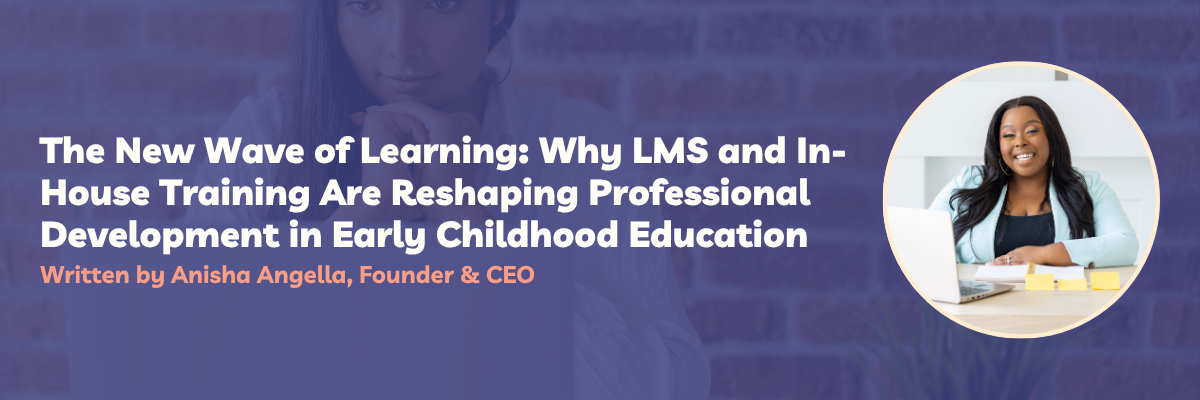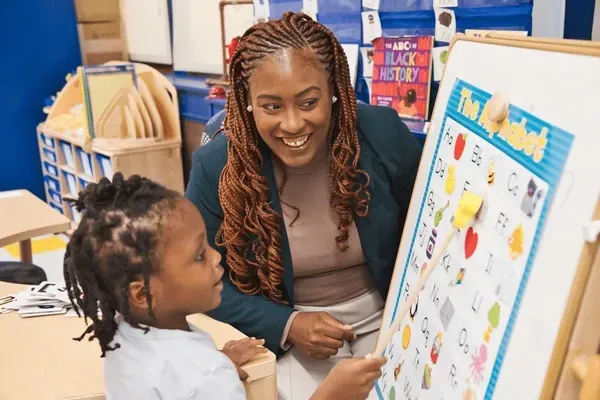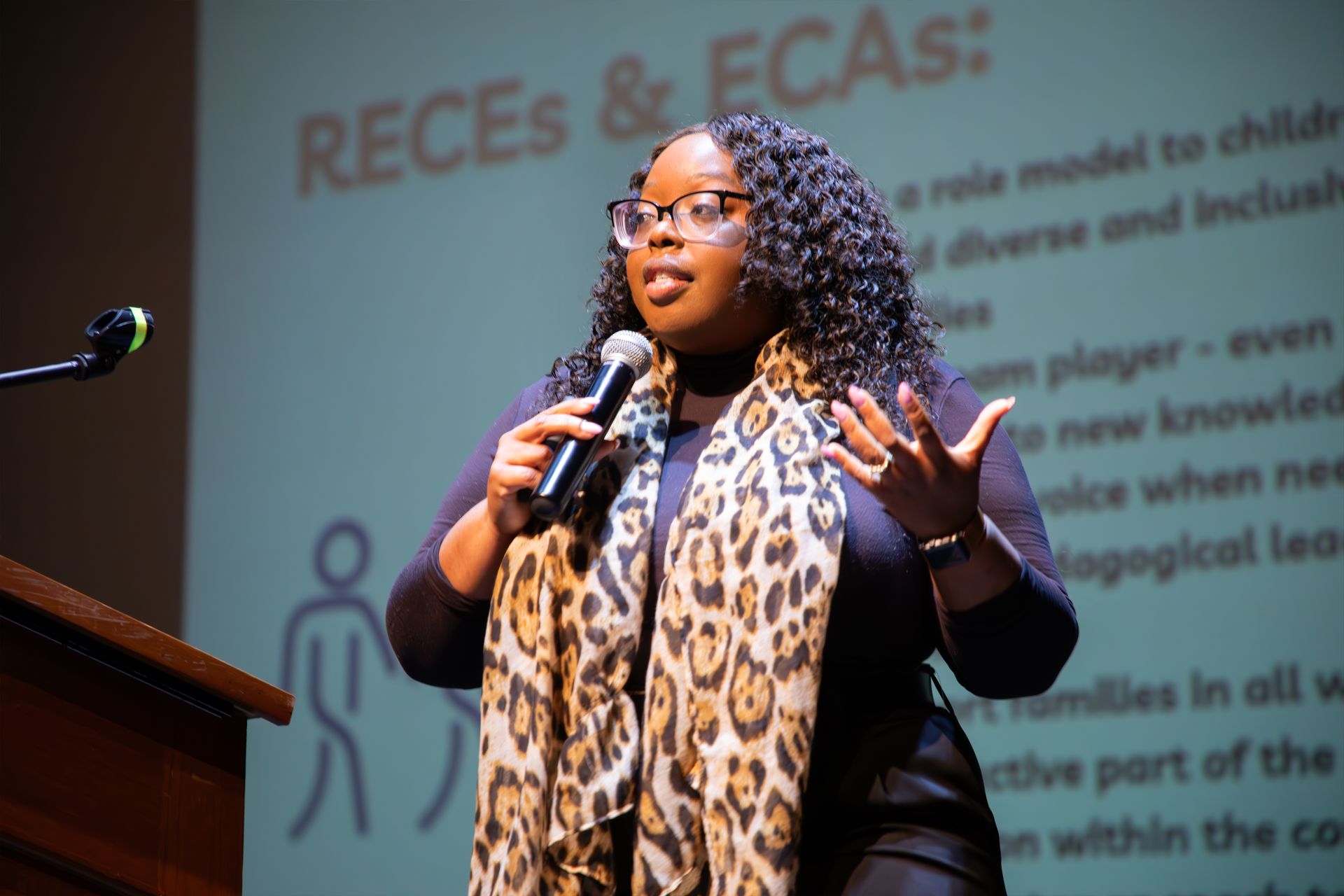In today’s fast-evolving world of early childhood education, professional development can no longer be a one-time event or an annual checkbox. The most innovative organizations are embracing a new model of learning — one that’s flexible, sustainable, and embedded into the culture of their team. Enter: the Learning Management System (LMS) and the rise of in-house training ecosystems.
🌍 The Shift to Ongoing, Accessible Learning
A Learning Management System (LMS) is a digital platform used to deliver, track, and manage training and education. Think of it as a virtual hub where your team can access workshops, modules, videos, and interactive learning activities — all at their own pace.
More than a trend, LMS platforms are becoming an essential tool for childcare organizations that want to stay aligned with licensing requirements, increase staff engagement, and reduce onboarding time for new educators. But even more importantly, they empower staff to grow in real time — with content tailored to their daily realities.
🔑 Why In-House Training is the Future
While outside PD sessions still have their place, the most successful teams are building their own internal learning pathways. Here's why:
- Consistency of Vision:
Your team learns based on your mission, values, and approach.
- Onboarding to Excellence:
New staff don’t have to wait for the next PD day — they can start strong from day one.
- Ongoing Growth:
Bite-sized, on-demand modules support continuous development.
- Retention and Culture:
Staff feel supported and invested in, which leads to stronger retention and a thriving culture.
🛠️ Real Examples from The ECC in Action
At The Early Childhood Coach, we’ve partnered with several organizations to embed professional learning directly into their LMS platforms and internal PD systems. A few highlights:
- Municipal Childcare Systems:
We’ve collaborated to develop custom DEIB (Diversity, Equity, Inclusion & Belonging) modules that align with each region’s policies and internal values, allowing leaders to track progress and integrate reflections into supervision meetings.
- Private Childcare Networks:
We’ve worked with national and multi-site childcare providers to create branded onboarding courses for new supervisors, educators, and program leads — ensuring every team member is set up for success from the moment they join.
- Independent Childcare Operators:
Even smaller programs are leaning into LMS tools with our help — accessing ready-made training libraries or customizing our ECC content into their systems with ease.
💡 A Moment to Reflect
If you're still relying on external workshops once or twice a year to train your team, ask yourself:
- Are we truly building a culture of learning?
- Do new team members get the training they need when they need it?
- Are we using our training time to reinforce our unique approach and values?
This is your opportunity to shift the way your team learns — and thrives.
Case Studies: How LMS & In-House Learning Are Transforming Early Childhood Programs
If you’re wondering whether investing in an LMS or in-house training system actually makes a difference, the answer is a resounding yes. Here are a few examples of how early childhood programs have already made the shift — and the tangible benefits they’ve seen:
📍Case Study 1: A Municipal Child Care System Builds DEI Competency Across 50+ Sites
A city-run child care network in Western Canada recognized the growing need for equity and inclusion training that was both comprehensive and consistent. Rather than relying on one-time sessions, they developed a 6-part DEI training series housed in their municipal LMS.
Each module was interactive and reflective, covering inclusive environments, anti-bias teaching, and culturally responsive family engagement. Completion was required within 90 days of hire, with annual refreshers built in.
Outcomes:
- 88% of educators reported feeling more confident in handling bias-related situations in the classroom
- Families began to report greater feelings of belonging, particularly those from immigrant and Indigenous communities
- Licensing consultants noted clearer evidence of inclusive practices during visits
📍Case Study 2: Private Preschool Chain Uses In-House Learning to Reduce Turnover
A preschool organization with 20+ locations across Ontario was struggling with high staff turnover, especially among new hires. To address this, they built an internal training portal using an LMS platform (Thinkific) that offered 30-60 minute onboarding modules covering curriculum planning, health & safety, and leadership support systems.
The training included video walkthroughs, self-paced reflection assignments, and supervisor coaching guides.
Outcomes:
- Reduced new staff turnover by 40% within the first year
- Managers reported faster onboarding and less confusion during probationary periods
- Employees said the self-paced format made them feel “set up for success instead of thrown in”
📍Case Study 3: Non-Profit ECE Agency Builds a Community of Learners with Hybrid PD
A non-profit ECE agency in Atlantic Canada wanted to create more consistent and engaging professional development. They launched a hybrid model: a digital PD hub with pre-recorded modules on topics like emotional development, Indigenous perspectives, and positive behavior guidance — paired with monthly virtual reflection circles led by senior educators.
Staff could access the digital content anytime and were encouraged to complete one module per month, then discuss their takeaways in small facilitated groups.
Outcomes:
- 94% of staff completed at least one module within the first three months
- The agency reported stronger cross-location relationships through discussion groups
- Educators began initiating their own mini “learning pods” to support one another
📍Case Study 4: Small Centre Goes Digital and Gains Confidence
A single-location centre in a rural community didn’t have the budget for big-name LMS platforms but knew their educators needed more support. They used a simple Google Workspace setup to house PDFs, recorded webinars, and reflective practice sheets — creating an “in-house training library.”
Educators were encouraged to spend one paid hour per month engaging with a topic of their choice, followed by a brief reflection shared in team meetings.
Outcomes:
- Staff reported feeling more valued and professionally supported
- New educators adapted faster to the centre’s values and routines
- The director used feedback to shape future training content around real team needs
These examples reflect a larger trend: training doesn’t need to be fancy to be effective — it just needs to be intentional. Whether you're a large organization with hundreds of staff or a small program serving one community, building an in-house learning system creates long-term benefits for your team, your families, and the children in your care.
🤝 Let’s Build Your Training Ecosystem
At The Early Childhood Coach, we specialize in co-creating custom training solutions, whether you're just getting started with an LMS or already have a system and want high-impact content. Our goal is simple: to help you build a confident, mission-aligned team through professional development that works.
📩 Ready to chat about bringing a modern training solution into your organization? Email us at info@anishatheecc.com to get started.
Let’s create the kind of learning culture your educators — and children — deserve.







